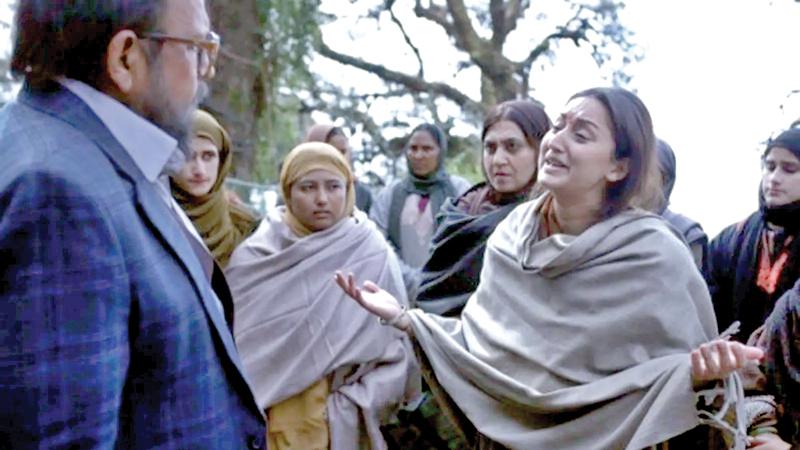
The critically acclaimed Hindi movie ‘Kashmir Files’ was recently screened in India and Sri Lanka. At the beginning it was screened at 500 cinema halls in India. The latest figures indicate the number has crossed 1,500 cinemas. During the first ten days the box office collection crossed 100 crore (1,000 million) Indian rupees.
The ‘Kashmir Files’ is a Hindi drama film written and directed by Vivek Agnihorti and produced by Zee Studios. The story is based on the exodus of Kashmir Pandits (Kashmir Brahmins) and the experiences of the ordeal when the Kashmir insurgency was at its peak in the 1990s. The film portrays it as genocide with a fictional storyline. It stars Anupam Kher, Darshan Kumar, Pallavi Joshi and Disco Dancer fame Mithun Chakraborty. In India the film has been endorsed, promoted and given tax-free concessions by state governments. Although the film became a box office hit, it has received mixed reviews.
 The direction, music, cinematography and performances of the cast have been described as outstanding. The film has faced accusations of historical revisionism. The story is based on a true tragic story which triggered emotions shedding light on the plight of Kashmir Pandits, a religious minority in the Kashmir Valley. They were subjected to atrocities and compelled to flee their homes by the Kashmiri separatists and religious extremists. To appreciate the film you have to know Kashmir’s history and its present situation.
The direction, music, cinematography and performances of the cast have been described as outstanding. The film has faced accusations of historical revisionism. The story is based on a true tragic story which triggered emotions shedding light on the plight of Kashmir Pandits, a religious minority in the Kashmir Valley. They were subjected to atrocities and compelled to flee their homes by the Kashmiri separatists and religious extremists. To appreciate the film you have to know Kashmir’s history and its present situation.
The history of Kashmir is intertwined with that of the Indian subcontinent. In the first half of the first millennium the Kashmir region became an important centre of Hinduism and later Buddhism during the Vedic period. Kashmir Pandits started settling down in Kashmir Valley.
According to Hindu mythology, Rishi Kashyapa had asked Brahmins to settle down in Kashmir. Hence it was named after him. During the reign of Ashoka (304-232 BCE) Kashmir became a part of the Maurya Empire, and Buddhism was introduced to Kashmir.
Emperor Kanishka (127-151 CE) conquered Kashmir and held the fourth Buddhist Council in Kashmir. It became a seat of learning for both Buddhists and Hindus. In 1339, a Muslim invasion took place and Shah Mir became the ruler of Kashmir.
The Muslim rule continued till 1846 when the Raja of Jammu Gulab Singh, a Hindu, became the ruler of Kashmir. The rule of his descendants continued under British rule until the accession of princely states in 1947. The partition of British India was contested by Pakistan. Ever since the partition of the Indian subcontinent and Kashmir princely states’ accession to India, Kashmir has become a trouble spot.
In 1990 nearly 600,000 of Kashmir Pandits were driven away from the Kashmir Valley by Muslim religious extremists because they were following a different faith. Kashmir Pandits became refugees in their own country.
The film graphically revisits the killings and the mass exodus of Kashmir Pandits and its aftermath. Based on the testimony of the survivors the film makes a strong point that it was not just an exodus but genocide. Kashmir Pandits still continue to hope for justice and fair play.
The Kashmir Valley was once a prosperous and multi-cultural territory of Kashmir. Today it is a troubled territory struggling to come to terms with peace and harmony. Kashmir Files rips open the band aid and showcases the real condition to the world. Along with the Hindus, thousands of moderate Muslims too have lost their lives at the hands of separatists. The film recreates real life incidents and we see them through the eyes of an elderly Pushkar Nath Pandit, his four friends and his grandson Krishna who is oblivious of his past and his parents. Pushkar Nath has not divulged the truth to his grandson.
Krishna’s search for the truth forms part of the story in the film. The director may have been inspired by Nelson Mandela’s speech on “Truth and reconciliation” in which he says, “Reopening old wounds may not offer a solution, but reconciliation and healing can happen only when the truth is accepted.” The director has handled the story well although some critics say the film is more like a documentary.
Anupam Kher’s performance as Pushkar Nath is outstanding. Pallavi Joshi is equally effective, but the build-up of her character could have been more layered and connected. Vivek Agnihotri bites the bullet and brings us closer to the pain and state of hopelessness of the Kashmir Pandits. The success of ‘Kashmir Files’ lies in moving the audiences to tears.
